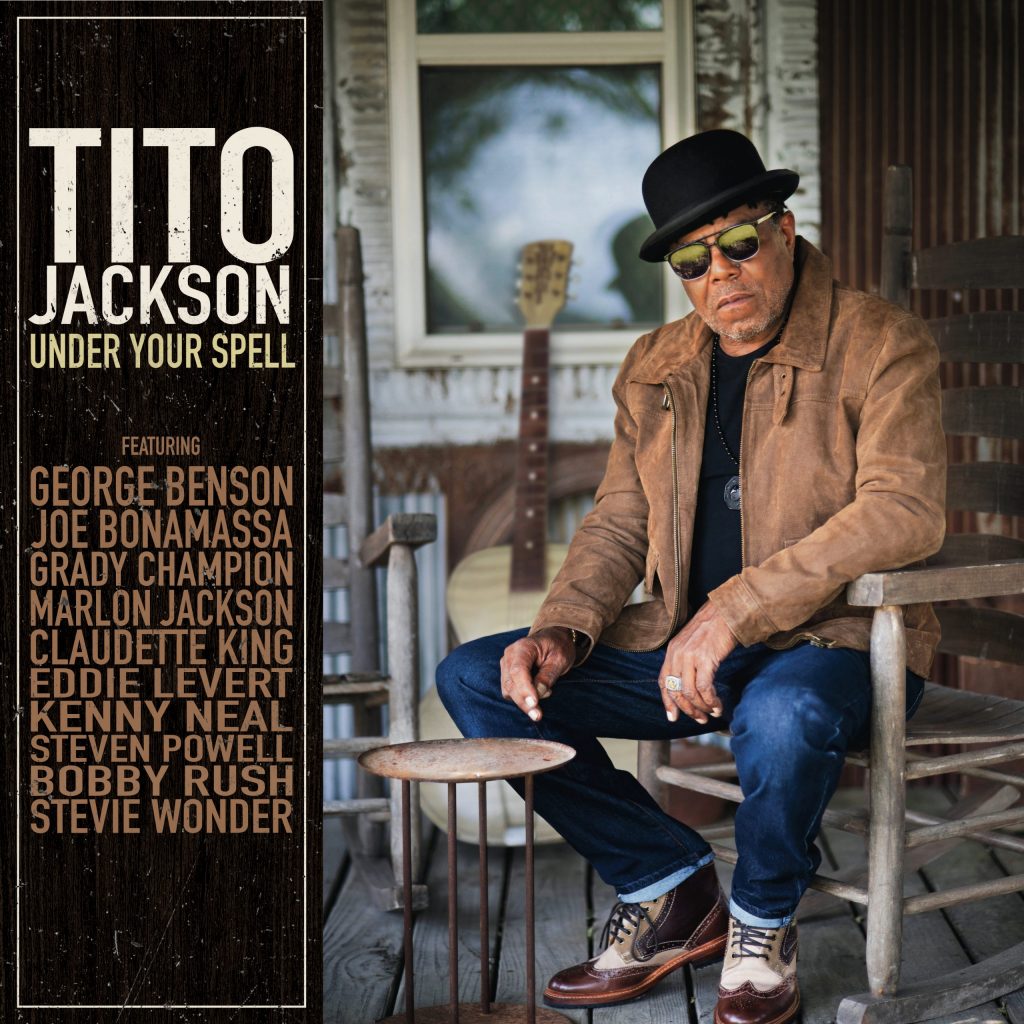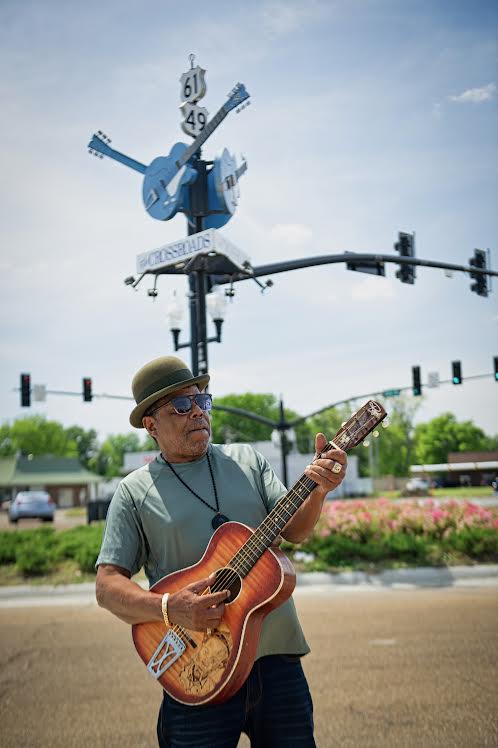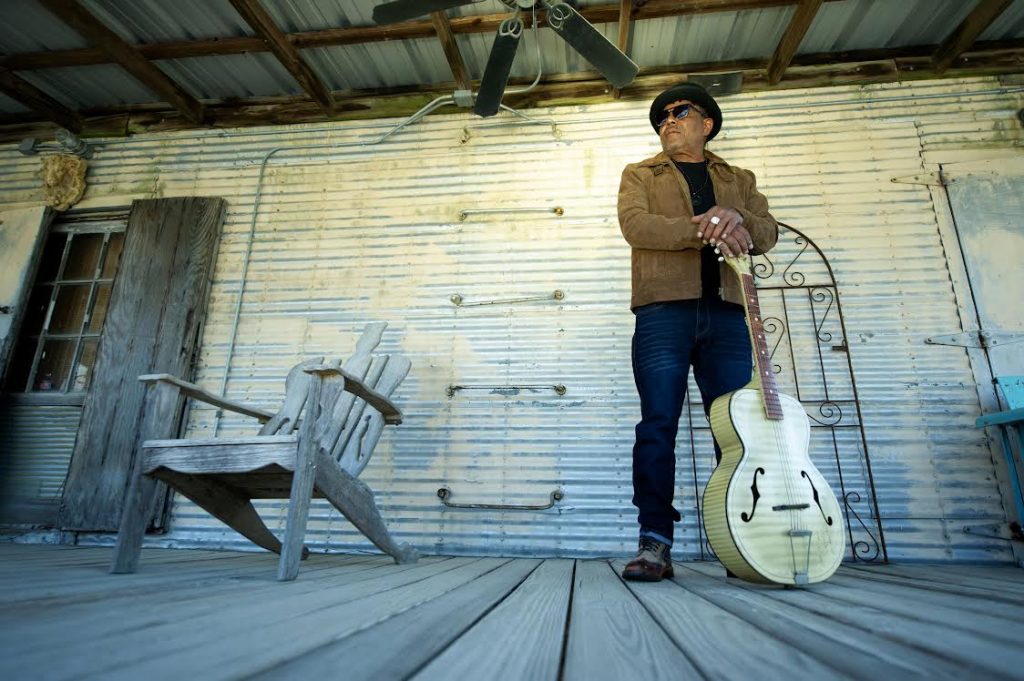Whether by nature or by nurture, Tito Jackson is a bluesman. His father Joe played guitar in The Falcons, a local blues band in Gary, Indiana; Uncle Luther Jackson fronted The Loose Cannon Blues Band and played the role of Pinetop Perkins in the 1980 Blues Brothers movie. Before the Jackson 5 became international pop phenomena, the young brothers were learning the blues from their elders and performing blues music in their sets through their years of talent shows and chitlin’ circuit gigs. Look back at those old Jackson 5 videos and you’ll see Tito playing gorgeous blues solos you might have missed as an 8-year-old.
Tito’s new album, Under Your Spell, is 100% blues and is out now via Mike Zito’s Gulf Coast Records. The 11-song collection beautifully illustrates what happens when you meld superstars of both the pop and blues worlds. As just one example, the single “Love One Another” has Stevie Wonder and Kenny Neal playing harmonica, and Bobby Rush shares lead vocal duties with Tito.

Bobby jumped onboard the project because, he said, “I wanted to be part of something that was good.” When Bobby lived in Chicago decades ago, he remembers Joe Jackson bringing his young sons by the house, and Bobby visited their home in nearby Gary, Indiana, as well. “Now we got many other people there, of course Stevie Wonder would be the biggest artist, but he ain’t the ground root of the blues,” Bobby said. “I am the ground root of the blues.” The blues icon has profound respect for the Jackson 5 and knew that his energy and rhythm would be valuable to Tito in making the record. “Whatever Tito wants, he got it from Bobby Rush.”
Baton Rouge artist Jonathon Long, whose own interview with ABS came out earlier this month, plays rhythm guitar on the title track alongside Joe Bonamassa on lead. It was a request from fellow Louisianan Kenny Neal that enticed Jonathon to sign up. “Kenny called me up and said, ‘Hey, Jonathon, I got this song I’m producing for Tito Jackson, and I need it to rock. Would you like to come in and help?’ I thought to myself, ‘That’s cool, Kenny Neal called me when he needs something to rock.’ The groove was hot, the band was on point, and working with Kenny in his studio always feels like working with family. What an honor to be a part of it.”
After giving Under Your Spell a very enthusiastic listen, ABS was eager to speak to Tito himself and find out more about his blues bona fides.
ABS: I hadn’t ever thought about the fact that the Jackson 5 played the chitlin’ circuit back in the day. Can you tell me about that? I bet you met some great blues musicians along the way.
Tito Jackson:
Yes, I met a few of them, but that was back in the days of the ’60s. The Jackson 5, some of the first music that we performed was a blues thing. We used to do some B.B. King and Johnnie Taylor.
My dad and uncle would get together and play blues every weekend. Plus, by us hearing that music and learning it, we also performed it in our shows. The whole show wasn’t blues, but we’d do four or five blues songs in a show.
I love that the pictures in the CD are from Clarksdale and out at the Shack Up Inn. Had you spent time in Clarksdale and that area before?
Yes, I spent a lot of time in Indianola at the B.B. King Museum and his gravesite. I was an avid B.B. King fan; I knew him personally. That was my first time in Clarksdale at the four corners. It’s beautiful just to hold history and the feel of it.
How do you relate to the Robert Johnson folklore around him, going to the crossroads? Do you believe that was an allegory or did he really make a deal with the devil at wherever these crossroads were?
I don’t know – to make a deal with the devil and be as successful as he was – I think it was more than the devil that helped him, you know? I think that’s just a fairytale. I think he did do the crossroads things, but as far as the devil, I don’t know.
I’m interested in your take on blues music. I know a lot of blues purists prefer their blues with the I-IV-V chord structure and the three-line stanzas with the first two lines repeating. You aren’t doing that kind of blues. How do you know when the music is blues as opposed to soul, rock and roll, folk, or country?
For me, it’s the feel. Since blues is responsible for a lot of other R&B and pop musics, and I’m from that world as well. It’s just that feeling. My main focus in doing the blues, and it’s been my motivation and drive the last four or five years, has been to introduce blues to a wider, younger audience.
People who still enjoy the Jackson music or whatever. However I can invite other people to support the blues because blues is the music I feel will always be around no matter whether it’s popular or not; it will always be here. It will always have that credit of being one of the first musics to start R&B, rock, pop, and all these other things. There’s a space in music where you can do blues, and it can attract younger ears.
Had you known Mike Zito before you joined Gulf Coast Records? How did you get hooked up with that label?
One of my colleagues, Terry Harvey, knew Mike Zito. I was trying to decide whether to go with Ruf Records or with Gulf Coast. I felt Gulf Coast was a better pick as they’re in Houston.
How did you pick the artists you wanted to contribute to the album?
With the single “Love One Another” I knew I wanted that harmonica on it, and
what better pick than Stevie Wonder from the pop world doing blues? Stevie Wonder fans are going to hear blues. That’s what I’m trying to do – get more of these listeners to give blues a chance.
It’s vital. I never thought of Stevie Wonder as a blues musician, as much as I adore his music. I’m so glad you’ve got an excellent outlook on this, bringing more people to the genre. It’s terribly important.
And Eddie Levert, too, is another one. Eddie is from the O’Jays.
His voice is amazing on there.
Oh yeah, he’s very popular.
You’ve got Kenny Neal filling all sorts of roles; he plays harp on “Love One Another” as well.
Me and Kenny been knowing each other 20-some years. We did some shows a long time ago together. He invited me on his stage when I was first starting to play more blues publicly. His whole family is blues. I look at them as the Jackson family of blues.
That was like two families coming together and doing something great as far as I was looking at it. I have blues artists, and I have R&B or pop artists all on that one song. I’m hoping “Love One Another” can attract more than just blues listeners; it can attract the listeners that don’t listen to blues that would research the song or artists they don’t know.

One thing I love about your album is you have “Big Leg Woman” on there. I’m beginning to think it’s a requirement on every blues recording that’s there something about a big-legged woman.
I wrote that song many years ago. Back in my era when I was a young man, that was the thing men adored about women was big legs, you know, well-shaped big nice legs. It’s pretty much what it was about. It’s about this guy who basically had gone out to dance and have a good time in the club, and he met this beautiful young lady.
He took her home with him, and he thought they would have fun, but he was too drunk. He woke up the next day, and here she is in his robe, her big legs are showing, and she’s cooking him breakfast. He don’t want no coffee or tea, he just say “those big legs is all I need.” So that’s pretty much what that song was talking about.
Had you known Bobby Rush before? He’s such an icon in this genre.
I had met Bobby many years ago. We were on some type of blues convention that we had both performed at.
The stories he can tell you, it’s amazing. He’s so much fun.
He’s one who guided me.
“All in the Family Blues” was written by Kenny Gamble and Leon Huff. Was that a pair of writers that y’all did songs from back in the early days?
Yes, in the early days, they wrote a lot of the hits for the brothers. They also wrote a lot of hits for the O’Jays – “Backstabber,” “Money, Money, Money.” (Tito sings “Money, Money, Money.”) Do you know that song?
Of course I do! I’ve got the O’Jays records here.
When I found out me and Eddie were going to do something together – I shouldn’t be saying this, but he’s thinking of going to the blues genre. That would be great. I mean, his voice would be phenomenal there.
And Grady Champion, did Kenny Neal bring him along for the ride as well?
No, I met Grady – Grady is a character – at Indianola. We were on the same bill. I love his energy on stage and his harmonica playing. We needed harmonica on “That Kind of Love,” so of course, I thought of Grady. He did a fabulous job. We fish a lot together; we have interests of cars together. I think Grady owns a car lot in his hometown and does work on cars. Works in his studio back of the house there. So yeah, Grady’s a nice guy.
Grady owns a car lot? There’s something new. I’d better ask about Joe Bonamassa – he has such a broad fan base. Had you known him before?
No, I didn’t know Joe before, but I knew of him being a guitarist. I said, “Boy, this guy can really rip.” I basically wanted to invite him to the album. The song “Under Your Spell” – we didn’t even have a song ‘cause I had asked Mike Zito if he’d think Joe would play on my record. He said, “Of course he would, he’s a friend of mine, and he’s a fan of the Jacksons.” A friend of mine sent me a picture that Joe Bonamassa had taken with Ringo Starr, and in the background was a poster of me and my brothers. They didn’t mean to get the poster in the shot; they were just taking a picture as two buddies, but the background – it was me, and I was the main focus in the photo with my guitar. So we were doomed to work together.
Blues is a music that’s fading not because it’s not good music; it’s not as popular as it used to be. It’s almost like the bell bottoms or the like yo-yo when it first came out. Like the twist or any other thing that came out in the past. They’re treating it like it’s that type of a product, and it’s not. It’s a spirit, it’s feelings, it’s soul, it’s storytelling. I look at it as one of the few musics for me that, if I’m in a depression, I can listen to a happy blues, and it makes me happy. Blues ain’t blue. It’s not all the I-IV-V stuff. It goes deeper when you start looking at some of the other songs. That’s basically what I feel.
I’m glad that your dad and Uncle Luther were able to expose you to the art form.
Like I said, the brothers did the blues, too.
Is there anything I haven’t asked you that you’d like folks to know about?
Basically I’d like them to check the record out and find their favorite song or songs and tell somebody. That’s basically it. I’m hoping to spread the word of blues because, like I was saying, there’s a lot of artists out here that don’t have to change the genre of music they perform, but they can make it with some blues elements in their music to make blues more noticeable. Even some of these rappers – they can rap to a blues beat. It’s just all about introducing people to this genre.
What did you think about Cyndi Lauper back in 2010 when she did a blues recording and was nominated for a Grammy? Is that the kind of thing you mean?
Absolutely. I think blues just needs to be promoted – put more blues in movies, commercials on TV, all kinds of things, songs, you know? It just needs to be commercialized a little more. It’s not going anywhere, like I always said it’s been around all this time, and it’s still around. They say what goes up must come down and what comes down is gonna go right back full circle. I think blues is in its full circle beginning years.
Have you seen any indication that non-blues focused radio shows will play cuts from this record?
That’s what I’m hoping; I’m hoping that other radio stations across the world – I know that other territories across the pond, that won’t be as much of a challenge as it would be here in our country. Blues is embraced in a lot of countries, France, Germany, Russia, the Netherlands.
There’s an event every year that the Blues Foundation puts on in Memphis, the International Blues Challenge. In 2020 there were 3 groups from South Korea. I’ve met people from Poland, Croatia, the Philippines; even India sent a band and the little gal singing sounded like Janis Joplin. I have a hard time understanding why the U.S. audiences don’t seem to embrace blues in the way that Europeans and other countries do. Do you have insight into that?
One thing I noticed by being a person that traveled the globe many times, America always comes up with the great idea first, but we forget quick. We’re looking for something new all the time. We forget about the old artists of yesterday and same thing with the music I think sometimes. What about R&B? Now it’s all about hip hop and rap. We throw away some great things we create. We look for some new creation. There’s nothing wrong with that, but don’t forget about what you did; what led you to the position you’re in. I think as long as America has that mindset, I know it will be a challenge.

